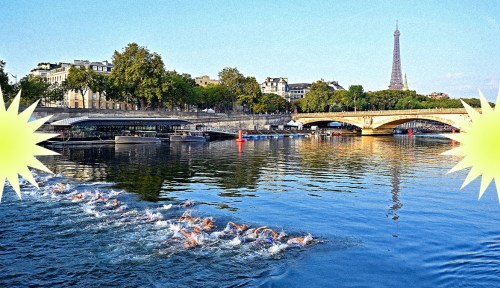Days after the men’s and women’s triathlon at the 2024 Summer Olympics, several athletes withdrew from the mixed relay competition on Monday, August 5 after falling ill.
Experts in This Article
According to the Associated Press, the mixed relay team for Belgium withdrew after triathlete Claire Michel became sick. The Belgian Olympic committee did not share further details on her illness.
Switzerland’s team was also affected by illness, with one triathlete contracting a stomach infection after the men’s triathlon. It’s unclear whether the illnesses were caused by the river water, and no other cases of stomach problems have been found among other teams that participated in open water events, per the AP.
Open water events have faced challenges throughout the Paris Olympics due to poor water quality in the Seine River. The men’s triathlon was postponed by a day after water tests showed high levels of E. coli and other bacteria, according to the AP.
Several other events are still scheduled to take place in the Seine, including the women’s and men’s marathon swimming events on August 8 and August 9, respectively.
In late June, test results of the water were murky. A French water monitoring group revealed contamination levels to be way above safe limits determined by the World Triathlon Federation, according to the Associated Press.
“Like a lot of older cities, the pipes [in Paris] that carry sewage and storm water are the same pipes, as opposed to separate pipes in newer cities,” Nicole Iovine, MD, UF Health’s chief hospital epidemiologist and an infectious disease specialist, tells Well+Good. “When there’s a lot of rain, those pipes can go over capacity, and then there’s runoff that ends up in the Seine or other bodies of water.”
In fact, the river has been off-limits to swimmers for the last 100 years because of high pollution levels.
France has invested $1.5 billion to upgrade the city’s sewer system and its wastewater treatment plants, and daily water quality tests have shown improvement. But bacteria levels in the river can change from day to day, Dr. Iovine says, especially after heavy rain.
So, what happens when you swim in E. coli-infested water?
High levels of E.coli in the river can be a legitimate concern for athletes’ health. As swimmers navigate the Seine, water inevitably gets into their eyes, ears, and mouth while they’re swimming toward gold.
If they ingest enough harmful bacteria, they could end up with diarrhea—similar to the effects of food poisoning. “That would be the most common [side effect],” Dr. Iovine says.
But there’s a smaller chance of more serious consequences: “If someone has a small open wound on their skin, that could become infected from swimming in the water,” Dr. Iovine notes.
How likely is it that the Seine River water made the athletes sick?
The likeliness of athletes getting sick from the river water is unclear, per Dr. Iovine. That’s because levels can change on a daily basis, so risk can be higher depending on the day (and the weather).
“It’s hard to say. If there’s a super high level of contamination and they’re swimming in it, then there’s a greater chance that someone would get sick,” Dr. Iovine says. “If levels are moderate or only a little bit above what would be the threshold, that makes it a lot less likely that someone will get sick.”
Olympic athletes also tend to be very healthy, younger people who are less likely to get sick overall, Dr. Iovine says.
Still, two swimmers are sick enough to bow out of competition. But at this time, it’s impossible to say whether the Seine River water was to blame.
You can watch the Paris Games’ open-water swimming competitions beginning August 8. NBCUniversal is the official U.S. broadcaster for the Paris 2024 Summer Olympics, but you you can also watch on Peacock, NBCOlympics.com, NBC.com, USA Network, CNBC, and E!
—reviewed by Jennifer Logan, MD, MPH
Sign Up for Our Daily Newsletter
Get all the latest in wellness, trends, food, fitness, beauty, and more delivered right to your inbox.
Got it, you've been added to our email list.











